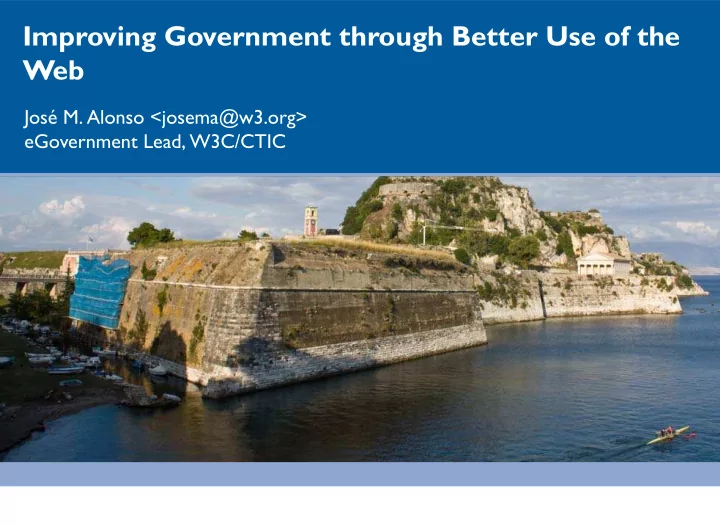

Improving Government through Better Use of the Web José M. Alonso <josema@w3.org> eGovernment Lead, W3C/CTIC
Disclaimers Formal work has just started We don’t have the solutions! trying to identify the challenges Not yet the view of the Group but the view of the charter
Role of the Web Source: Australians' Use of and Satisfaction with e-Government Services – 2007
Some Challenges 29% people would now prefer to contact government by internet, but more needs to be done... Improve content and design of websites Strategies to make government services easier to find Security is a fundamental condition Source: Australians' Use of and Satisfaction with e-Government Services – 2007
eGovernment at W3C Activity to tackle issues in three main areas: Open Standards Participation and Transparency Data Integration
Open Standards: Big Picture
Organization vs. User
One stop shops
But... Example: get to a purchase order Click 2 javascript: links Go through 3 pop-up windows Finally, get to a URI like this: https://www.example.com/PublicAccess/PA_POCheck.aspx?IdPurchase=YES& QS=ER4TEngVFRMXeBQSERIfHxQ=
Replay (with common sense) Example: get to a purchase order Click one regular link Get to a URI like this: https://www.example.com/PurchaseOrders/2008/05/19/IDXXX or https://www.example.com/PurchaseOrders/IDXXX
Open Standards Policies Governments should not require people to purchase particular software to access information Promote longevity of information Openness helps to maximize reuse of knowledge colleagues, departments, agencies, citizens, companies, other governments, other partners Open standards promote research
... and then... “application must be conformant with W3C standards”
What W3C offers
Open Standards: challenges What’s the best way to enable a given policy goal? What’s the right tool for the job? How should I use X plus Y? Suite of open standards to solve the Web-related issues
Participation and Transparency Users are going away...
How do citizens search? They often use a search engine very few go to the one-stop shop even less to the given agency Web site They get a pointer to Wikipedia (or similar) Happy with what they get
Not convinced yet? In a Google search of five keywords or phrases representing the top five news stories of 2007, which will rank higher? Weblogs New York Times' Web site
Inversion of Authority
Sophistication is there... Benefits from eGovernment projects at different levels of sophistication to a mid-size OECD country Source: OECD through The Economist
...but it's not enough Source: Deloitte Research (2005) through The Economist
Organizational change is also a must! Fires in California (late 2007) We can no longer afford to work at the speed of government. We have responsibilities to the public to move the information as quickly as possible … so that they can make key decisions. Brian Humphrey and Ron Myers (LAFD)
P A R T I C I P A T I O N Yes, in upper case! Find ways to engage the users Collaborative Tools Change, Innovate if not, others will do it for you (e.g. third party services)
Put the information where needed Examples: US Library of Congress + Flickr = Commons USPTO: Peer Reviewed Prior Art Patent Third Party Services: FixMyStreet, Follow the Money, MapLight, OpenCongress, GovTrack, TheyWorkForYou
Risky? challenging... fun! Reliable source of information? To mix or not mix What happens to the authoritative source of information that the government is? ...but also from Chicago Crime through London Metro Police up to Show Us a Better Way
Transparency has many faces Accessible Web site Open Government Information
Granularity and Provenance Avoid Obscurity by Default
Participation and Transparency Challenges Use collaborative tools balance risks design a contingency plan Identify provenance of information Release as much as possible balance with restrictions
Data Integration Why XML is not always enough?
Semantic T echnologies Example: reducing the cost of road excavations Geographic Referencing Framework ...many more SWEO cases
Linked Data No more scraping cost, maintenance Start simple RSS, Atom, Microformats, GRDDL, RDFa No need to throw away your existing systems, build on top Metadata are the goal (data mashups) Linking Open Data project Open Government Data Principles
A Word of Advice Authoritative source Trust Provenance Security Integrity
Data Integration: challenges Linked Data (maximize data integration and re-use) Increase metadata Roadmap for transitioning from existing systems Don’t throw away, build on top Metadata use policies Trust-related challenges
Mobile Phones (Photo Source: NY Times ) What services to prioritize? How? Where? Mobile Web for Social Development W3C Goal: to make the Web accessible, relevant, usable and useful for under-privileged populations and rural communities
eGovernment at W3C Improving access to government through better use of the Web Interest Group: forum for discussion Collective effort Governments, Industry, Citizens, Civil Societies, other International Bodies Identification and description of existing challenges and propose ways to address them Three Task Forces: Usage of Web Standards, Transparency and Participation and Seamless Integration of Data Outcome: Creation of an interdisciplinary forum Identification and documentation of challenges and propose good practices to tackle them (Group Notes)
Removing the "e" from eGovernment Online services not just an alternative Becoming “the” public services More important than ever to solve problems
Thanks and Q&A José M. Alonso <josema@w3.org> Slides at: http://www.w3.org/2008/Talks/0926-Corfu-JA/ eGovernment at W3C: http://www.w3.org/2007/eGov/
Recommend
More recommend